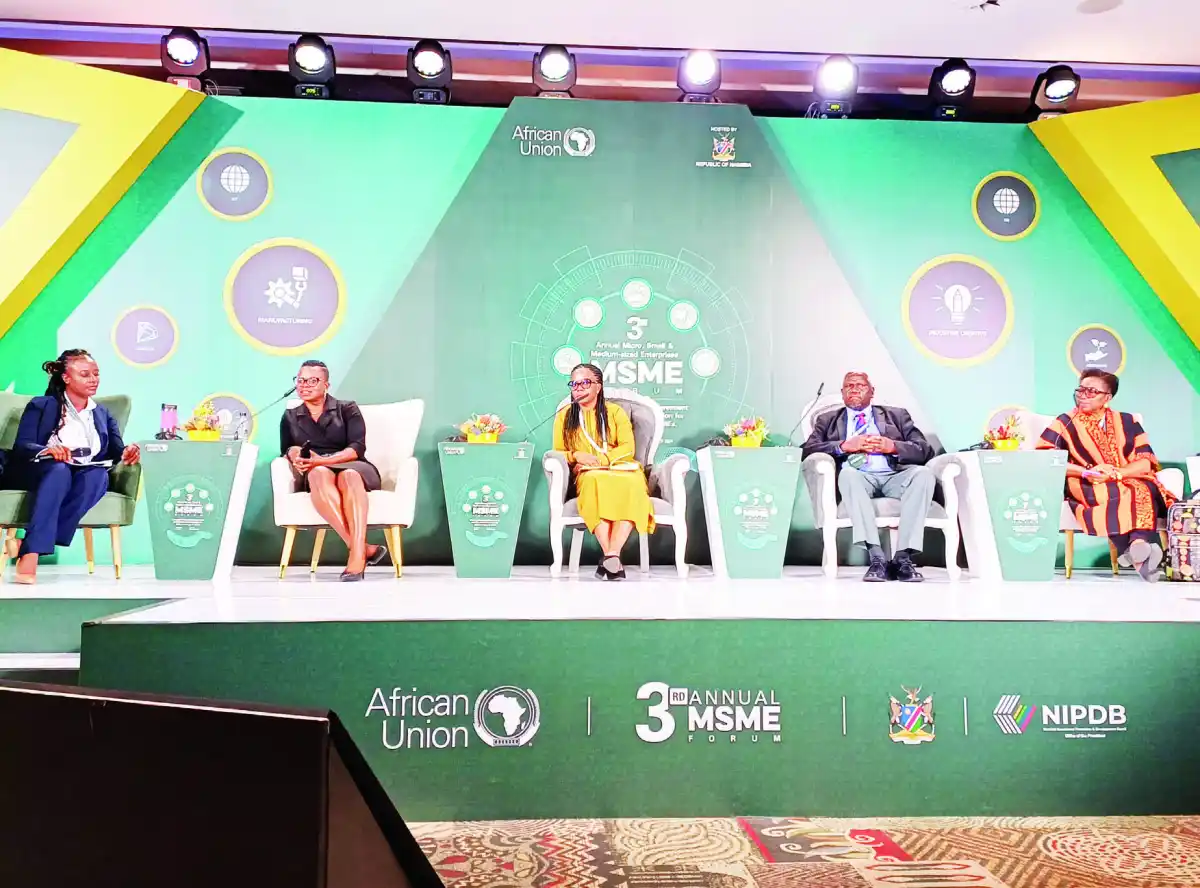
By William Kumwembe in Windhoek, Namibia:

Chinwe Ezenwa, a 73-year-old Nigerian entrepreneur, faces a mammoth crowd of largely youthful and budding African small-scale businesspersons at the start of the 3rd Annual Micro, Small, and Medium-sized Enterprises (MSMEs) Forum in Windhoek, Namibia.
She holds an African fabric-made travelling bag while carrying with her over 39 years’ business experience, specialising in bags making for local and export markets.
She boasts of earning a minimum $100,000 per annum from exports of the products to Ethiopia, Rwanda, Ghana and Kenya, among other countries.
Her brand, Le Look Nigeria Limited, became the first in Nigeria to receive the African Continental Free Trade Area (AfCFTA) Certificate of Origin—an international trade document which enables ease of doing business beyond borders.
It certifies that a product being exported is wholly manufactured, produced, processed or obtained from the exporting country and that it can be given preferential treatment.
The certification applies to goods to be exported to a country that has ratified the AfCFTA agreement, a pact structured to facilitate continental trade integration.
And Ezenwa appears to already have had a glimpse into the future of the African trade landscape.
She says she envisions a unified continent, where traders and business people would, at all levels, connect with no barriers.
“The future is very bright with the AfCFTA. I call it [the AfCFTA] a certificate of prosperity. If you can handle it well, it will handle you well,” she tells the audience with an energetic tone and higher pitch.
Her sentiments fill the hall with a sense of euphoria, attracting rounds of applause among the apparently enthusiastic entrepreneurs gathered.
Ezenwa pauses a bit, to enable some level of tranquility in the space, before she proceeds to state that the AfCFTA brings about a space for innovation and creativity for young African entrepreneurs.
The AfCFTA—the continent’s single biggest trading bloc—would create a market of more than 1.3 billion people and a combined gross domestic product of over $3.4 trillion.
If fully implemented, the AfCFTA could leverage intra-African trade and increase trade among member states by up to 110 percent.
In addition, the AfCFTA could lift up to 30 million people out of extreme poverty and up to 68 million people out of moderate poverty.
But to survive in such a space, businesses should build a competitive edge according to Ezenwa.
“Capacity building remains key: Training has helped us to position ourselves as a force to be reckoned with. So, the ideals can only thrive if we train the young people to do the job.
“We want an Africa of our dreams by 2063. You cannot give what you don’t have. So, thrive for the best,” she says as she signs off.
Themed ‘Fostering Financial Empowerment and Educational Innovation for African Startups and MSMEs,’ the forum brings together small-scale business operators from all the 54 African countries and is structured to foster financial empowerment and innovation among them.
It is designed for MSMEs to engage with experts, peers, and tackle the challenges facing small businesses at large, and accelerate their growth.
Officials from the African Organisation for Standardisation (Arso)—a regional body aimed at harmonising African standards, c o n f o r m i t y assessment and procedures in order to reduce technical barriers to trade— are seen mentoring the participants at the indaba.
Their prime focus is to promote intra-African and international trade as well as enhance industrialisation, according to its Technical Director Reuben Gisore.
He says MSMEs should take advantage of the intergrated African market under the AfCFTA with focus on quality and standards.
“The approach is to address, in a more targeted way, any barriers. SMEs should think and look into the bigger market. Open up borders and make sure that we are trading seamlessly.
“But follow standards; don’t make a mistake because it is a free trade area then you walk freely. There are rules,” he states.
The AfCFTA targets removing tariff barriers between African countries.
And projections of the World Bank points to the lifting of 50 million Africans out of extreme poverty by 2035 and increasing incomes by nine percent to $571 billion once it fully materialises.
According to AU Commissioner for Economic Development Trade Tourism Industry and Minerals Albert Muchanga, industry players need to be systematic and strategic in harnessing the market.
His opening speech, full of thought-provoking questions, remains, to participants, a catalyst reflection.
He states: “One can also scale up through clustering with similar enterprises at national, regional or even continental levels. The question is: are you pursuing such openings to take advantage of markets like the African Continental Free Trade Area, the Africa Growth and Opportunity Act of market access to the United States of America and the Chinese market openings, among others?”








0 Comments